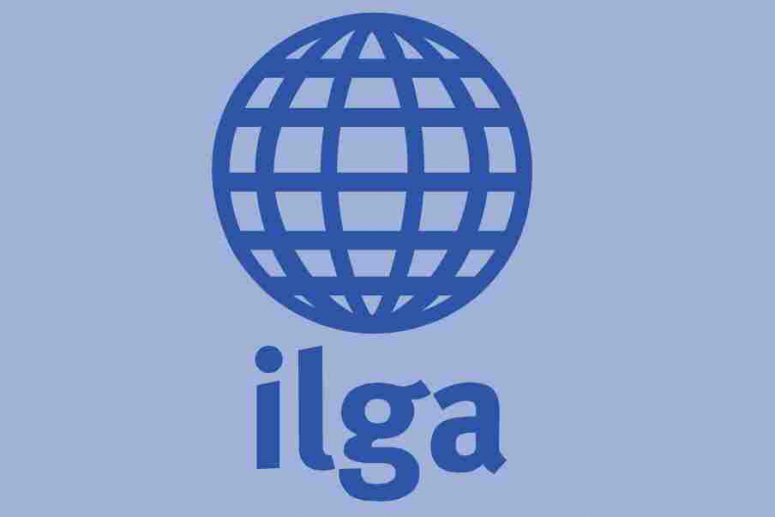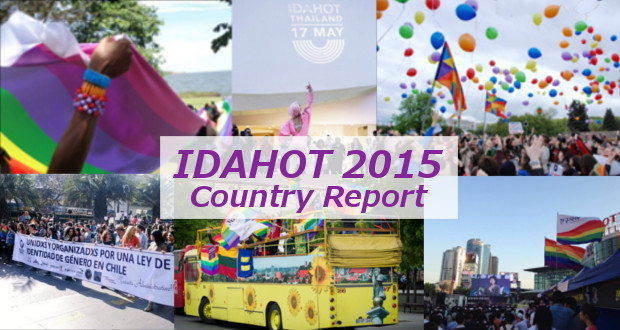A few days before the International Day Against Homophobia and Transphobia, ILGA launched at the Palais des Nations in Geneva the 10th edition of its annual report on State-Sponsored Homophobia, a world survey of laws: criminalisation, protection and recognition of same-sex love, authored this year by Aengus Carroll and Lucas Paoli Itaborahy.
The launch on May 13 featured a panel discussion on International Human Rights relating to Sexual Orientation and Gender Identity. Speakers included Mona Rishmawi from the UN Office of the High Commissioner for Human Rights, Ambassador Regina Maria Cordeiro Dunlop of Brazil, co-author of the report, Aengus Carroll, LGBT rights defender, Joseph Sewedo Akoro, ILGA Executive Director, Renato Sabbadini and President of Riwi Corporation, Eric Meerkamper. 
“While in 2006 – said the Authors – 92 countries criminalised same-sex sexual acts between consenting adults, we now see this number falling down to 76 countries in 2015. However, the situation is still unacceptable: more than one-third of the world’s States consider same-sex sexual activity illegal. On the other hand, although 2013 saw an alarming rise in the number of States considering a new wave of criminalisation through “homosexual propaganda” laws, in fact only a small number actually implemented them.”
“Surveys – said ILGA Co-Secretaries General Ruth Baldacchino and Helen Kennedy – are there for interpretation and our general interpretation of this world survey is that some countries have it better or worse than others. However, we do not stop there. We see the analysis of the legal situation in countries as one of many layers of analysis. This report provides us with a solid platform from which to understand, discuss, lobby, advocate and analyse further.”
“When we lift that legal layer – continued Baldacchino and Kennedy – we find many brave individuals, organisations operating on shoestring budgets, networks of activists, scholars, policy-makers and other professionals, risking their livelihood (and often their lives) to fight for what is right. We find lesbian, gay, bisexual, trans, intersex and queer people manoeuvring through political, social, religious, cultural and linguistic battles to be recognised and respected. These are efforts, initiatives and actions that empower us.”
As expected, a picture of lights and shadows emerges from the report, in particular:
- there are 117 countries (UN Members) where same sex sexual acts between adults in private are legal. Mozambique and Palau have decriminalised same-sex acts in 2014 and Lesotho in 2010.
- there are 76 countries where same-sex sexual acts are still illegal. Chad introduced a new Penal Code in 2014, punishing anyone who has sex with persons of the same sex.
- In relation to death penalty, eight States officially legislate for it, but only five (Mauritania, Sudan, Iran, Saudi Arabia and Yemen) actually implement it, but a sixth State, Iraq, although not in the civil code, clearly has judges and militias throughout the country that issue the death sentence for same-sex sexual behaviours. Further, some provinces in Nigeria and Somalia officially implement the death penalty. We are also aware that in the Daesh(ISIS/ISIL)-held areas the death penalty is implemented (although a non-State actor, it is listed in the report). Brunei Darussalam is due to activate the death penalty for same sex sexual acts in 2016, but it seems likely that like Pakistan, Afghanistan and Qatar although it is on the statute, it will not be implemented.
- Regarding the recent legal practice, emerging from Russian provinces first in 2006, to criminalise the ‘propaganda of homosexuality’, it is with some relief that we note that in fact to date only four countries actually appear to have adopted this on their statute books: Algeria, Lithuania, Nigeria and Russia.
- Discrimination in employment based on sexual orientation is now prohibited in 63 countries, including Chile (2012), Samoa (2013), Namibia (2004) and city of Buenos Aires in Argentina (2015).
- A total of 7 countries have a constitutional prohibition to discrimination based on sexual orientation, including Mexico (2011) and Virgin Islands (2007) – associate of the United Kingdom
- Hate crimes based on sexual orientation are considered an aggravating circumstance in 34 countries. Laws in this respect have been identified in several European countries, including Andorra (2005), parts of Bosnia and Herzegovina (2013), Iceland (2004), Kosovo (2013), Lithuania (2009), Montenegro (2010), Norway (1994), Serbia (2012), Slovakia (2013), Slovenia (2008).
- Incitement of hatred based on sexual orientation is prohibited in 31 countries. Austria has introduced such law in 2011, Hungary in 2013, Montenegro in 2010 and Switzerland in 2015.
- Marriage is open for same-sex couples in 18 countries, including in Luxembourg and Slovenia, both in 2015. The state of Coahuila in Mexico and 19 further states in the United States of America have passed same-sex marriage laws in 2014, bringing the total number of states legislating for marriage equality to 37 (plus the District of Columbia). Finland approved a marriage equality law in 2015 that will come into force in 2017, while Estonia approved a similar law in 2014, to come into force in 2016.
- Joint adoption by same-sex couples is legal in 19 countries. It was legalised in Luxemburg and Malta in 2014, and in Austria , Ireland and Slovenia in 2015.
The 2015 State-Sponsored Homophobia Report can be found here
The 2015 Lesbian, Gay, Bisexual Map of World Laws can be found here
For more information contact:
Renato Sabbadini, Executive Director, ILGA
director@ilga.org



